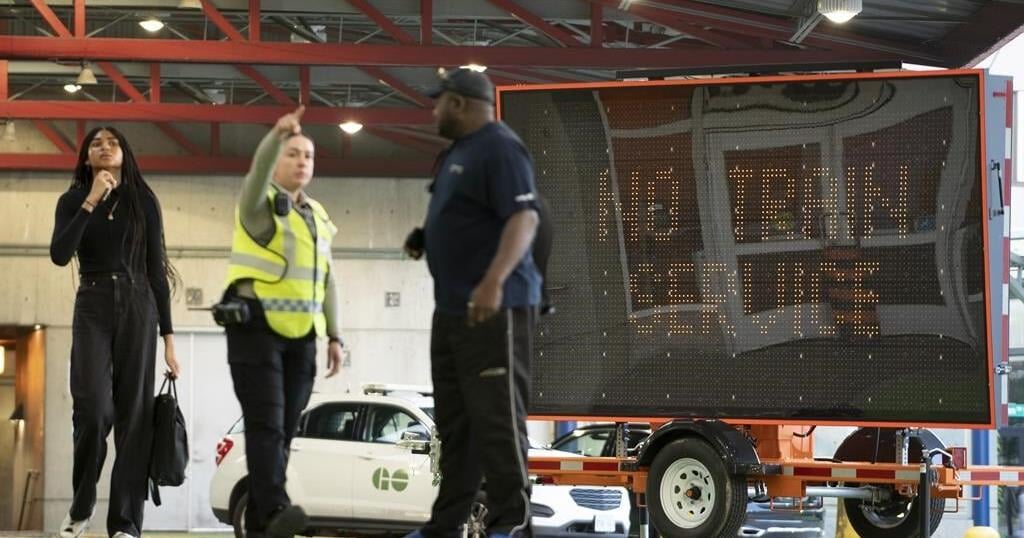Some commuters in the Toronto area will have to make alternate travel plans for a second day despite Ottawa’s intervention in an unprecedented Canada-wide rail lockout.
The agency responsible for GO Transit says service will not resume Friday on the Milton line or at the Hamilton GO station, which serve a combined 8,100 customers.
A spokesperson for Metrolinx says the agency will keep customers updated as more information becomes available.
Bewildered commuters were turned away from shuttered rail lines on Thursday as the lockout upset travel plans for more than 30,000 daily riders in some of Canada’s largest cities.
Labour Minister Steven MacKinnon has announced he’s asking the Canada Industrial Relations Board to impose final, binding arbitration to end the work stoppage.
Canadian National Railway Co. said later in the day that it has ended its lockout of workers, while Canadian Pacific Kansas City Ltd. says it’s preparing to restart operations.
CN and CPKC locked out workers after they failed to reach a deal on a new contract before a midnight deadline, the first time there has been a simultaneous shutdown on Canada’s two largest railways.
The lockout has delivered a blow to commuter railways in Montreal, Toronto and Vancouver that run on CPKC-owned lines. The impact is limited to those lines because dispatchers at CN, which hosts a greater number of passenger trains, are not part of the bargaining process and would not take part in a work stoppage.
Some commuters arrived Thursday morning at GO Transit stations along the Milton line, which cuts through Mississauga to Toronto’s Union Station, only to learn service had been suspended.
“This is completely unacceptable, and we should have been informed earlier,” said Om Sangekar, speaking outside the Cooksville GO station.
“I’ll definitely be late for work.”
At Toronto’s Union Station Thursday afternoon, several passengers stood in front of a train departures screen displaying information on disruptions.
Among them was Rose Hurren, who was on the phone with a family member trying to figure out an alternate route home to Mississauga after learning the Milton GO train service was suspended.
“My train is not going, so I don’t know what’s happening,” Hurren said, adding that she’s facing at least 45 minutes added to her travel, including two more bus rides. “This really messed up my commute.”
Metrolinx spokesperson Andrea Ernesaks said the system appeared to be moving well outside the affected line and station. No station overcrowding or parking issues had been reported, she said.
“So far, no pinch points and no significant concerns raised, but of course, we’re always monitoring very closely,” she said in an interview.
“We understand that any kind of disruption to travel can be very inconvenient for our customers, and we just thank them for their patience and apologize for the inconvenience.”
In a statement posted to social media, Ontario Premier Doug Ford said the shutdown was already costing workers, transit users and businesses.
‘We cannot afford to let things get worse,” he said.
In the Montreal area, some 21,000 commuter rail passengers had travel plans upended after service was suspended on three of the Exo network’s train lines — with no alternative bus or shuttle services planned until next week.
Exo said workers would be on the ground Thursday and Friday to help orient customers. The service plans to have some shuttles available as of Monday but warned that the number of available buses was insufficient to fully replace the trains.
The shuttles would be focused on serving stations outside the Island of Montreal and at rush hour, Exo said.
“Given Exo’s limited financial and operational capacity, the proposed mitigation measures will primarily serve peak hour train travel,” the transit service said. “The frequency of the shuttles will be planned, but they will not be assigned to a specific schedule.”
In the Vancouver area, TransLink said it’s offering supplemental bus service for its suspended West Coast Express service. The transit service said more than 3,000 passengers take the line each day.
Bargaining has played out in separate negotiations between each rail company and the Teamsters, which represents 6,000 CN workers and 3,300 CPKC workers.
The Teamsters has said both companies are pushing to weaken protections around rest periods and scheduling, while CN is also seeking a scheme that would see some employees move to far-flung locations for several months at a time to fill labour gaps.
CN said it has negotiated in good faith over the past nine months, proposing serious offers with better pay, improved rest and more predictable schedules. CPKC has called for binding arbitration, saying the union has made “unrealistic demands.”
— with files from Morgan Lowrie in Montreal and Sharif Hassan in Toronto.
This report by The Canadian Press was first published Aug. 22, 2024.
Companies in this story: (TSX: CNR, TSX: CP)























